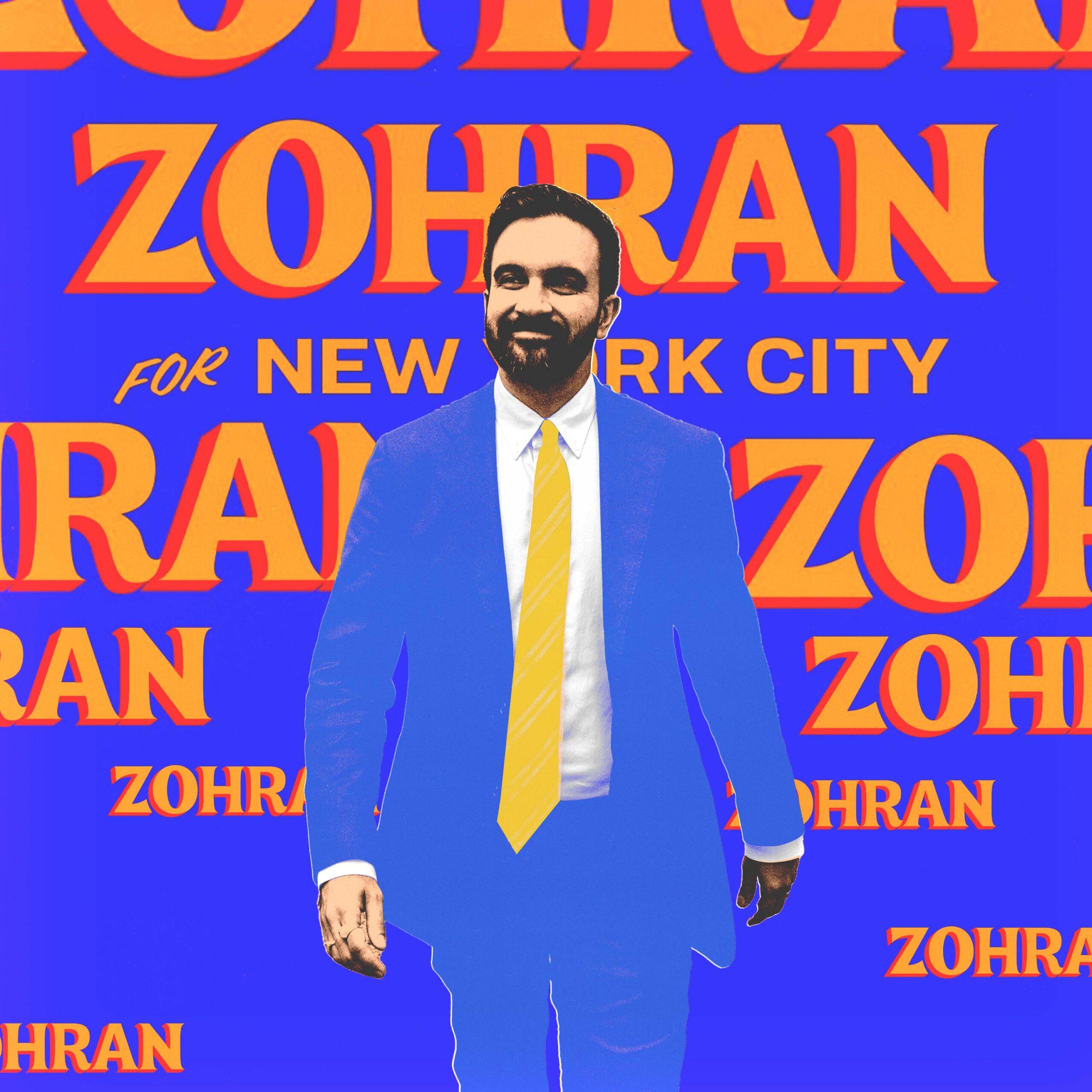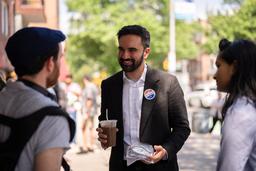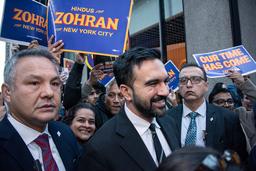First, I want to remind everyone that this is an electoral off year: typically a boring, restorative period for political junkies as everyone politely ignores the odd gubernatorial race in New Jersey. Alas, this year’s race for mayor of New York City has rather spectacularly devolved into a brawl over several contentious issues: Gaza, socialism, and the superior strategy to countering Trumpism.
Zohran Mamdani, the 34-year-old democratic socialist assemblyman from Queens, is the seemingly invincible front-runner in a race that has inflamed tensions within the Democratic Party—liberals vs. leftists, social justice vs. economic populism, Zionists vs. anti-Zionists, woke vs. anti-woke. He’s ascending in a period when Democrats nationally are nervously rethinking their optimal posture against the fearsomely resurgent Donald Trump. Mamdani’s chief opponent in Tuesday’s election is Andrew Cuomo, New York’s roundly disgraced ex-governor, who launched an independent bid for mayor after Mamdani upset him in this summer’s Democratic primary.
Mamdani built his long-shot mayoral campaign, in the nation’s most expensive big city, around the watchword of affordability. He’s pitching a four-year rent freeze on 1 million apartment units and a series of tax hikes to help finance new subsidies, including free buses and free childcare. He wants the city to own and operate at least one grocery store in each of the five boroughs in an effort to expand access to and lower prices for healthier options. Given his socialist bona fides and his highly unconventional agenda—not to mention his anti-Zionism, which we’ll unpack in a bit—Mamdani has naturally drawn opposition from the more conventional figures in his party, as well as the more vocal billionaires in the city. He has, in any case, waged the sort of campaign that anxious liberals have spent the past few years demanding from the Democrats: a campaign less invested in the culture war and personality flaws of Trump and more responsive to the priorities of working-class voters.
Furthermore, Mamdani is notably chill. He’s come to disprove the stereotype of modern progressives as neurotic and censorious; Mamdani was, in fact, by far the most evidently well-adjusted candidate to make it to the general election between Cuomo, the scandal-ridden Eric Adams, and the outlandish Curtis Sliwa. Mamdani’s moderate temperament has a way of softening his otherwise striking pitches: He’s idealistic where others seem quixotic and determined where others seem obstinate. He was a long shot where others would’ve simply been doomed. He’s also an earnest conversationalist, eminently approachable. In one of his earliest breakout videos on Instagram, Mamdani surveyed Trump voters in Queens and in the Bronx, showing an easy openness to good-faith engagement with more than just college-educated liberals and progressives and also underscoring his common cause with these voters in prioritizing the cost of living.
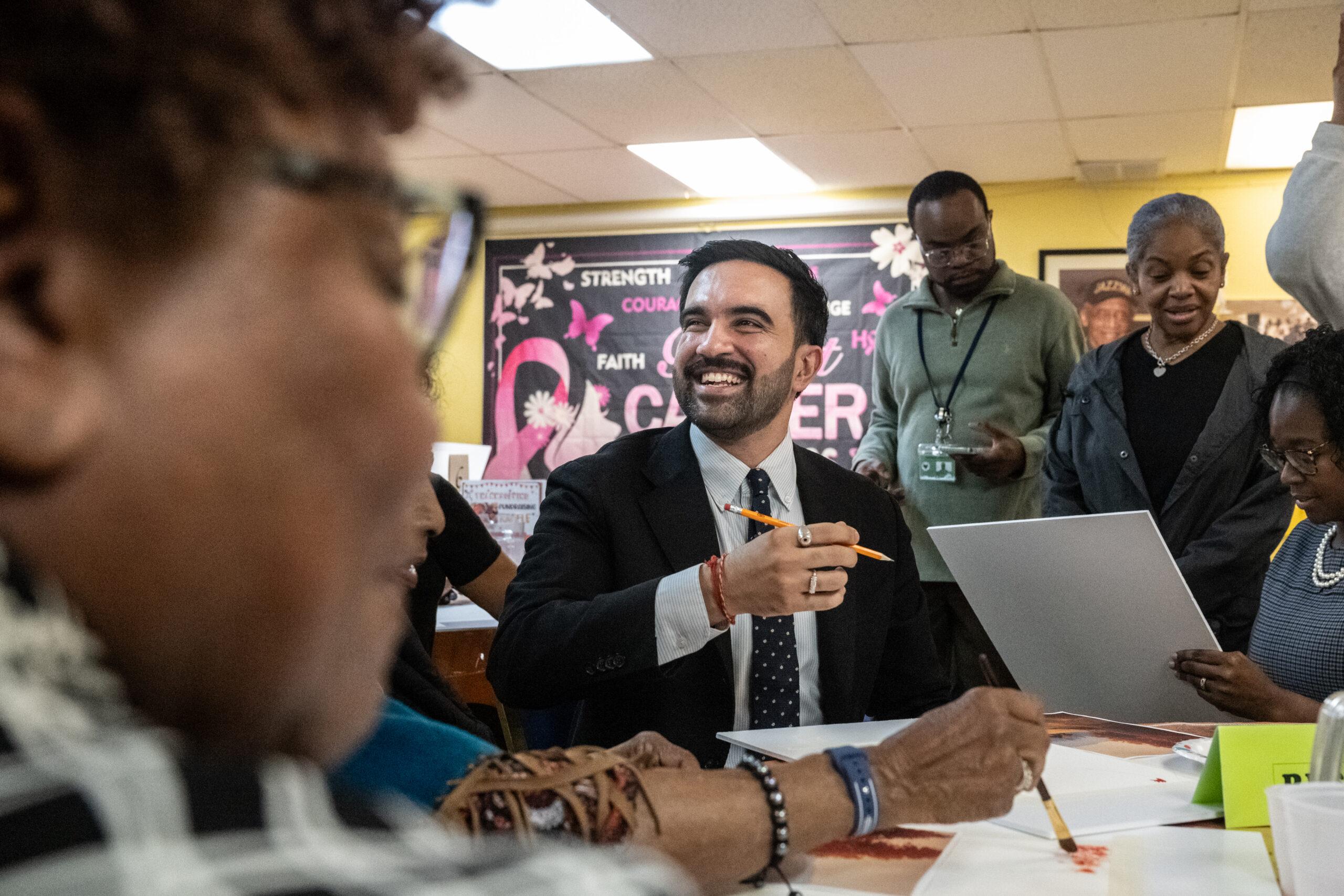
Mamdani at a “Paint and Pour” session at a senior center in Brooklyn
For a charismatic socialist, Mamdani seems pragmatic enough; he is more than happy to flatter and retain Police Commissioner Jessica Tisch if that’s what it takes for a former proponent of defunding the police to buy some early peace with the NYPD. So it’s easy enough to hear Mamdani talk free buses and free childcare and still see him as more Obama than Sanders, a rational operator who ultimately recognizes the limits of his charms, who will certainly explore new options for making groceries more affordable but won’t actually deploy his million-door canvassing operation to annex Gristedes.
Mamdani’s fiercest opponents see a progressive who, sure, presents a friendly enough face to more moderate audiences but in reality leads an army of campus radicals and a resurgent wave of wokeness. His election next week will surely throw the city into a fit of hate crimes, budget crises, breadlines, and catastrophic infrastructure failures and, ultimately, prompt a fearful exodus from New York City. “We saw our clearest sign yet that this radical insurgent movement in the Democrat Party is succeeding, and they are ending what has always been known as the Democrat Party in America,” Republican House Speaker Mike Johnson said on Sunday after his Democratic counterpart, Hakeem Jeffries, endorsed Mamdani.
There’s alarm, and then there’s this derangement—the telltale sign of a losing faction’s reckoning with the messy realignments of the past decade.
Such derangement in Mamdani’s opponents has rendered it all but impossible for them to get a grip on his success, on how such a supposedly unserious operator with an obviously disastrous political program is nevertheless winning this race by a comfortable margin. They’re determined to rehearse only the most self-soothing explanations: The socialist was too phonily charming, the press too predictably fawning, the electorate too regrettably gentrified, and the field too perfectly divided by alternative candidates who were either badly damaged (Adams, Cuomo) or hopelessly irrelevant (Sliwa).
Mamdani, on the other hand, has succeeded in large part due to his constructive eagerness to understand what has and hasn’t worked for the left’s electoral insurgents across the country, what has won voters over to left-wing positions on some subjects but alienated them on others. There are crucial lessons here, on both style and substance.
New York state Senator Zellnor Myrie, also in his 30s and similarly plugged into the new media landscape, never quite caught fire in the mayoral primaries; where Myrie typically gave verbose, contemplative, and meticulously nuanced answers to questions of affordability, Mamdani made stark, straightforward pitches for his signature proposals. Freeze the rent. No-cost childcare. Fast, free buses. Simple as. His social media strategy was relentlessly modern. Videos, videos, videos: He’s typically smiling in his suit and tie, broadcasting a mix of wonkery and meme-ery from his man-on-the-street perspective. He owns the streets indeed: He’s flooded the city—and the internet—with his bright, bold, bodega-core iconography. His imprint is unmistakable. His canvassers are inexhaustible. His biggest rivals were much better known than him, perhaps, but also much more dourly defined.
Adams, the incumbent first-term Democratic mayor of New York, was never exactly popular. He narrowly won a lockdown-era clusterfuck of a Democratic primary with historically low voter turnout. He then inevitably won the general election in a Democrat-dominated city in a sleepwalk against Sliwa. In office, Adams inherited a housing shortage that has, despite some potentially productive movement in the long run, only worsened on his watch; he mismanaged a massive influx of migrants and pissed off people in every corner of the larger immigration debate in the process. He also suffered a tremendously engrossing scandal in two acts: (1) In September 2024, the feds, under Joe Biden, brought a corruption case against Adams, primarily concerning his financial dealings with Turkey; but then (2) Adams ultimately escaped prosecution in April 2025 by cutting an unseemly deal to aid citywide deportation efforts for the second Trump administration. A stalwart coalition might have nevertheless rallied around Adams, if only to block a more progressive successor, but then Cuomo, who resigned from office after multiple women reported that he had sexually harassed them, made a late entry into the Democratic primary and further complicated the coalitional calculus. Would the centrists and conservatives of New York ultimately unite behind the cartoonishly crooked incumbent mayor or the badly tarnished former governor? Adams would be rendered moot, as he got outpolled by even Sliwa. This left Cuomo as the de facto leader of the lib-con crossover coalition to stop Mamdani.
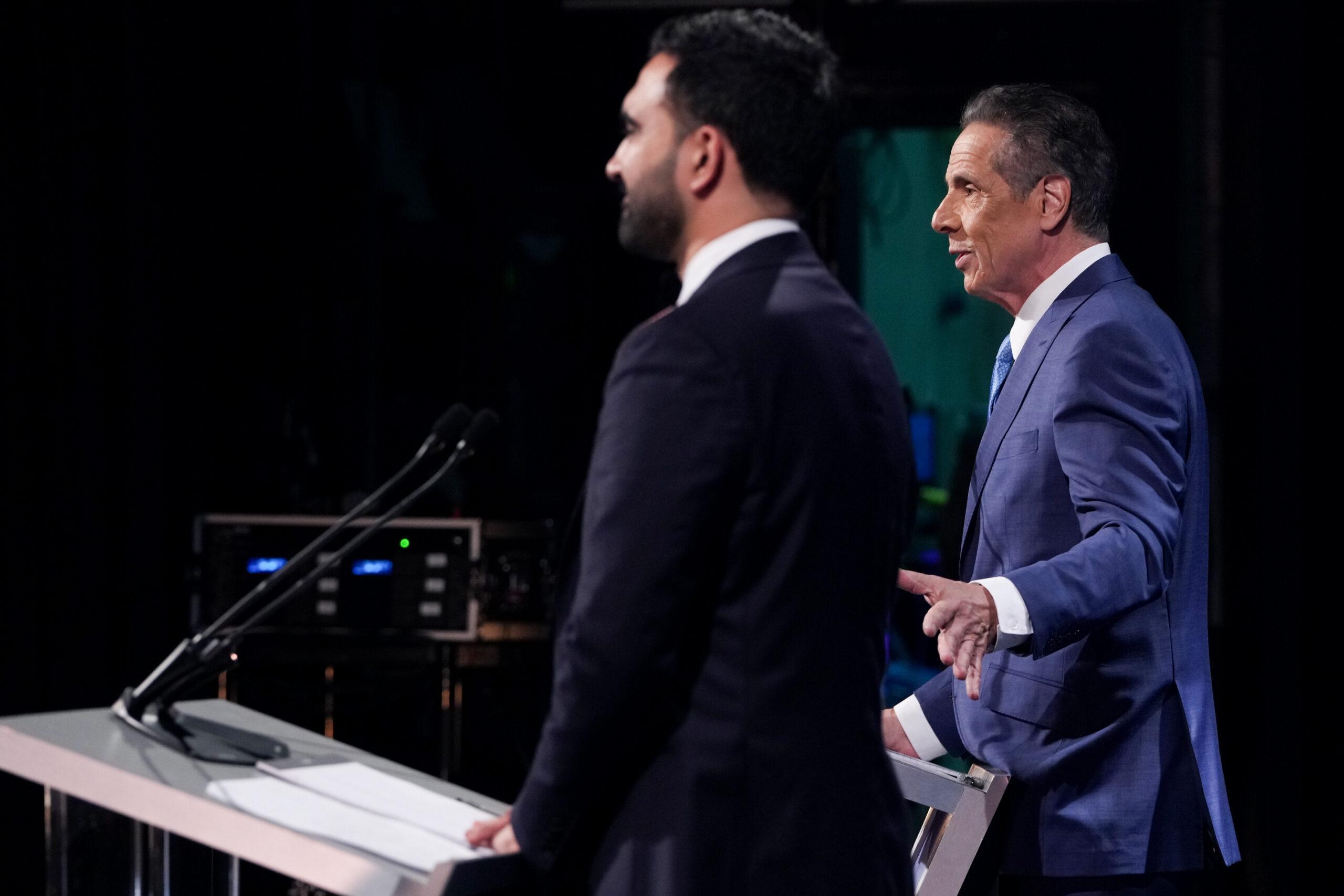
Cuomo and Mamdani during a mayoral debate on October 22
Cuomo and his allies—now including Trump and J.D. Vance, if only temporarily—have assailed Mamdani, a Muslim born to Indian parents in Uganda, as a kurta-clad, third-world bogeyman. Cuomo has persisted in a tedious effort to reframe the mayoral election as a debate over the existence of Israel and the war in Gaza; in this narrative, Mamdani is a friend of Hamas and an enemy of the city’s 1 million Jews. Last week, Cuomo sat for an interview with the conservative radio host Sid Rosenberg and laughed along as Rosenberg snarked at the thought of Mamdani “cheering” another 9/11 as mayor. (Cuomo and Mamdani have spent the final stretch of the race going back and forth over this ugliness.) What fascinates me about Cuomo’s efforts to court conservatives and other anti-woke types is the fact that he never even attempted to connect in terms of economic populism—the obvious approach, don’t you think?—but instead reflexively resorted to a weirdly retro campaign against political correctness. To the extent that Cuomo has sporadically flirted with modernity, the results have been off-putting: After some immediate backlash, Cuomo’s campaign quickly deleted one particularly wacky, AI-generated spoof ad depicting a variety of violent criminals—a pimp, a drug dealer, an abusive husband—each effusively endorsing Mamdani. The contrast is stark: Mamdani is often broadcasting from a random sidewalk in the city as he taunts Cuomo directly, and happily, while Cuomo battles Mamdani distantly, and miserably, with a mix of bots, astroturfing, and background interviews with the New York Post. You get the sense that Cuomo for NYC Inc. is just barely being run from one man’s Lenovo in the Hamptons.
Zohran Mamdani didn’t impress voters with a promise to comp everyone’s rent. He impressed voters by standing his ground and guarding his dignity in the face of such derangement.
Earlier this month, Ezra Klein hosted the political scientist Suzanne Mettler on his podcast for a discussion of her new book, Rural Versus Urban, about the steady evaporation of rural support for the Democratic Party. The short story: Democrats have become terminally disconnected from rural voters, and the gains they’ve made with suburban voters in the past decade are an insufficient offset, given the disproportionate representation of rural areas in our national politics via the Senate and the Electoral College. “For the first time in our history,” Mettler explained to Klein, “all of these advantages are consolidated in one party”—the GOP.
So this longish reflection on the rise of Mamdani comes with all the standard disclaimers about overextrapolation. Democrats do not historically have too many problems winning mayoral elections in New York. Mamdani is a democratic socialist in one of the nation’s most liberal cities with the oldest and largest DSA chapter in the U.S.; he’s in many ways a world apart from the electoral challenges facing Democrats in Indiana or West Texas. He may well be a generational candidate who inspires a wave of copycat campaigns all over the country, imitating his style, if not fully adopting his platform—though it’s worth pausing to consider what it would even mean for other candidates to imitate Mamdani. Is it just the basic idea of livestreaming a wonky stroll and slathering all over a city the candidate’s signs and brochures in a cool typeface? No, I think it’s something much deeper than his video production or his art design or his fashion.
The constructive lesson for Democrats really is in the running backlash to Mamdani’s anti-Zionism: a backlash that tested his ability to link the new progressivism with economic populism while withstanding the full force—that is, the derangement—of the MAGA movement and the old, waning liberalism alike. Mamdani has pledged to protect the city’s Jewish communities amid the global surge in antisemitism, and he has conceded the fear and anxiety caused by anti-Zionist slogans such as “globalize the intifada”—but he has not budged from his fundamental sympathy for the Palestinians in Gaza. Mamdani has not, in other words, revealed himself to be easily cowed. This was Trump’s great advantage, you’ll recall, against Ted Cruz, Marco Rubio, John Kasich, et al., at a low point in the country’s regard for the GOP, whenever the subject on the debate stage turned to immigration or Iraq. Trump understood his base, he saw the political potential in populism, he spotted the signs of a great realignment, he recognized the broad contempt for the political establishment, and, for better or worse, he seized the reins. He simply ignored the last panicked gasps of the old consensus. Paul Ryan only halfway understood him and was in any case helpless against him.
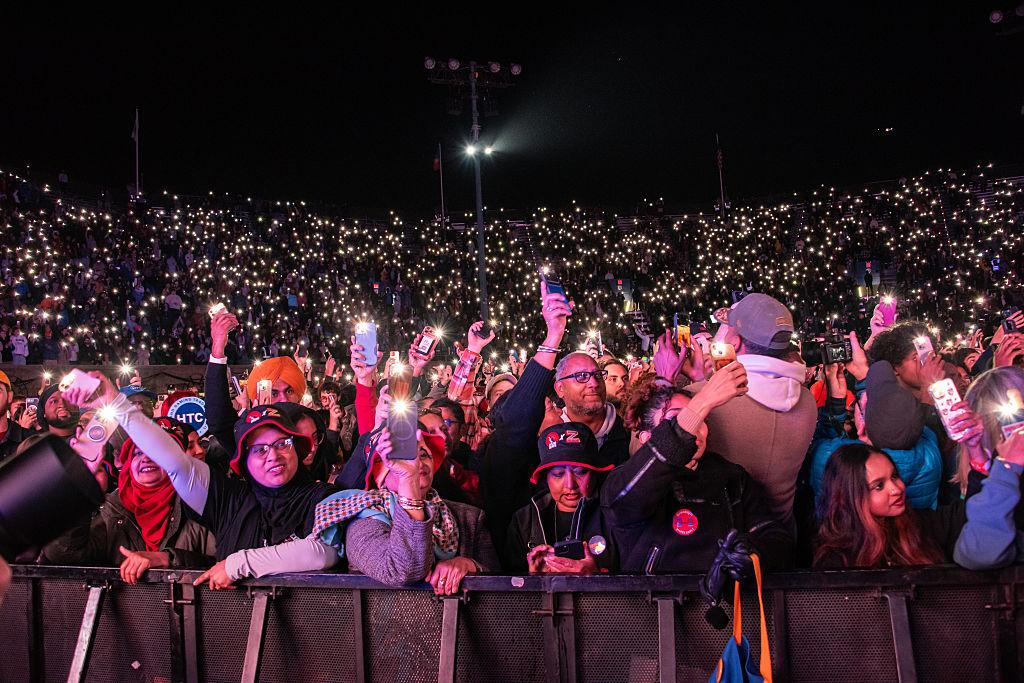
More than 13,000 people pack Forest Hills Stadium in Queens for Mamdani’s New York Is Not for Sale rally on October 26
A similar helplessness was evident in the routine sightings of House Democratic leader Jeffries waffling blankly—until the last minute—whenever reporters would ask him whether he’d ever get around to endorsing his party’s nominee for mayor of his hometown. (Senate Minority Leader Chuck Schumer, meanwhile—also from New York—hasn’t endorsed Mamdani at all.) The cringeworthiness wasn’t in the congressman’s reluctance so much as the helplessness it implied: One easily got the sense that Jeffries, one of the most powerful Democrats in the country, was dutifully awaiting permission from some higher power to develop and articulate his position. Adams and Cuomo both tried to play-act some populist candor, but they were both betrayed by their need to nervously tiptoe around the subject of Trump.
Democrats have spent the past decade, since Sanders collapsed against Clinton, and especially the past several months, since Kamala Harris collapsed against Trump, thinking of populism as their obstacle. They’ve repeatedly pitched themselves to voters as the do-gooder institutionalists and in doing so played right into the most flattering characterization of Trump: He says what he means and does what he says, or at least pretends to have done as much, while his opponents stay hand-wringing and backbiting in the wings, naively imploring voters to heroically rescue a political order that the polls clearly show they detest. Democrats have consistently billed Trump’s dramatic gestures at populism as a disingenuous cover for the old corporate conservatism, but then they’ve also struggled in their own right to prioritize the repair of the left’s standing with the working class.
Mamdani, in his improbable march to Gracie Mansion, has dramatically shown what it would look like to shove off the distractions of the past decade and proceed with a clearer purpose. Now, what about the rest of the party?
